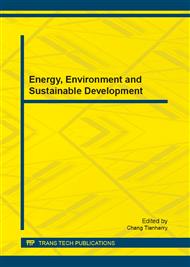[1]
Clark, S.J., L. Wagner, M.D. Schrock, P.G. Pinnaar, Methyl and Ethyl Esters As Renewable Fuels For Diesel Engines 1984, 1632-1638.
DOI: 10.1007/bf02541648
Google Scholar
[2]
Meher, L.C., Vidya Sagar, D. and Naik, S.N., (2006), Technical aspects of biodiesel production by transesterification-a review, Renewable and Sustainable Energy Reviews, 10, issue 3, pp.248-268.
DOI: 10.1016/j.rser.2004.09.002
Google Scholar
[3]
Handbook of plant-based biofuels, Ashok Pandey, (2009).
Google Scholar
[4]
Biofuels, Wiley series in renewable resources, Wim Soetaert, Erick J. Vandamme, (2009).
Google Scholar
[5]
Herchel T.C. Machacon, Seiichi Shiga, Takao Karasawa, Hisao Nakamura, Performance and emission characteristics of a diesel engine fueled with coconut oil–diesel fuel blend, Biomass and Bioenergy, Volume 20, Issue 1, January 2001, Pages 63-69.
DOI: 10.1016/s0961-9534(00)00059-3
Google Scholar
[6]
Knothe, G, Improving biodiesel fuel properties by modifying fatty ester composition, Energy & Environmental Science, Issue 7, 2009, Pages 759-766.
DOI: 10.1039/b903941d
Google Scholar
[7]
Lujaji, F. Bereczky, A. Janosi, L. Novak, Cs. Mbarawa, M., Cetane number and thermal properties of vegetable oil, biodiesel, 1-butanol and diesel blends, Volume 102, Issue 3, 2010, Pages 1181-102.
DOI: 10.1007/s10973-010-0733-9
Google Scholar
[8]
http: /www. lowcvp. org. uk.
Google Scholar
[9]
Stalin, N. Prabhu, H. J. Performance test of IC engine using karanja biodiesel blending with diesel, Journal of Engineering and Applied Sciences, Volume 2, Issue 5, Start page 32, (2007).
Google Scholar
[10]
Praveen, K. S. Yadav, Onkar, Singh and R. P. Singh. Performance test of palm fatty acid biodiesel on compression ignition engine, Journal of Petroleum Technology and Alternative Fuels Vol. 1(1), p.1–9, (2010).
Google Scholar
[11]
Oguntola J ALAMU, Opeoluwa DEHINBO, and Adedoyin M SULAIMAN, Production and testing of coconut oil biodiesel fuel and its blend, Leonardo Journal of Sciences (LJS), Issue 16 (January-June), 2010 (9), pp.95-104.
Google Scholar
[12]
Lalita Attanatho, Panida Thepkhun, Amornrat Suemanotham, Kasamar Petchtabtim, Yoothana Thanmongkhon, Peesamai Jenvanitpanjakul and Yuji Yoshimura, Oxidation Stability of Biodiesel from Tropical Crops, Thailand Institute of Scientific and Technological Research Environment, Ecology and Energy Department.
Google Scholar
[13]
A. Gopinath, S. Puhan, and G. Nagarajan, Relating the cetane number of biodiesel fuels to their fatty acid composition: a critical study, Proceedings of the Institution of Mechanical Engineers, Part D: Journal of Automobile Engineering, vol. 223, pp.565-583, (2009).
DOI: 10.1243/09544070jauto950
Google Scholar
[14]
Gerhard Knothe, Robert O. Dunn, A comprehensive evaluation of the melting points of fatty acids and esters determined by differential scanning calorimeter, J Am Oil Chem Soc (2009) 86: 843–856.
DOI: 10.1007/s11746-009-1423-2
Google Scholar
[15]
Ertan Alptekin, Mustafa Canakci. Determination of The Density and The Viscosities of Biodiesel-Diesel Fuel Blends, Renewable Energy, Volume 33, Pages 2623-2630, (2008).
DOI: 10.1016/j.renene.2008.02.020
Google Scholar
[16]
Pedro Felizardo, M. Joana Neiva Correia, Idalina Raposo, João F. Mendes, Rui Berkemeier, João Moura Bordado, Production of biodiesel from waste frying oils, Waste Management, Volume 26, Issue 5, 2006, Pages 487-494.
DOI: 10.1016/j.wasman.2005.02.025
Google Scholar
[17]
Reeta Rani Singhania, Binod Parameswaran, Ashok Pandey. Plant-Based Biofuels 2009, Handbook of Plant Based Biofuels, 11.
DOI: 10.1201/9780789038746.sec1
Google Scholar
[18]
Warawut Tiyapongpattana, Prapin Wilairat, Phillip J. Marriott. Characterization of Biodiesel and Biodiesel Blends Using Comprehensive Two-Dimensional Gas Chromatography, Journal of Separation Science, Volume 31, Issue 14, Pages 2640-2649, (2008).
DOI: 10.1002/jssc.200800234
Google Scholar
[19]
Siddharth Jain, MP Sharman. Stability of Biodiesel and Its Blends : A Review, Renewable and Sustainable Energy Reviews, Volume 14, Pages 667-678, (2010).
DOI: 10.1016/j.rser.2009.10.011
Google Scholar
[20]
Abderrahim Bouaid, Mercedes Martinez, José Aracil, Long storage stability of biodiesel from vegetable and used frying oils, Fuel, Volume 86, Issue 16, November 2007, Pages 2596-2602.
DOI: 10.1016/j.fuel.2007.02.014
Google Scholar
[21]
Gerhard Knothe, Some aspects of biodiesel oxidative stability, Fuel Processing Technology, Volume 88, Issue 7, July 2007, Pages 669-677.
DOI: 10.1016/j.fuproc.2007.01.005
Google Scholar
[22]
Bryan R. Moser, Steven F. Vaughn. Coriander Seed Oil Methyl Esters as Biodiesel Fuel: Unique Fatty Acid Composition and Excellent Oxidative Stability, Biomass and Bioenergy, Volume 34(4), (2010).
DOI: 10.1016/j.biombioe.2009.12.022
Google Scholar
[23]
Gita Mohanty, Suparna Mukherji, Biodegradation rate of diesel range n-alkanes by bacterial cultures Exiguobacterium aurantiacum and Burkholderia cepacia, International Biodeterioration & Biodegradation, Volume 61, Issue 3, April 2008, Pages 240-250.
DOI: 10.1016/j.ibiod.2007.06.011
Google Scholar
[24]
D.Y.C. Leung, B.C.P. Koo, Y. Guo, Degradation of biodiesel under different storage conditions, Bioresource Technology, Volume 97, Issue 2, January 2006, Pages 250-256.
DOI: 10.1016/j.biortech.2005.02.006
Google Scholar
[25]
Ayhan Demirbas, Relationships derived from physical properties of vegetable oil and biodiesel fuels, Fuel, Volume 87, Issues 8–9, July 2008, Pages 1743-1748.
DOI: 10.1016/j.fuel.2007.08.007
Google Scholar
[26]
Ayhan Demirbas, Importance of biodiesel as transportation fuel, Energy Policy, Volume 35, Issue 9, September 2007, Pages 4661-4670, ISSN 0301-4215.
DOI: 10.1016/j.enpol.2007.04.003
Google Scholar
[27]
http: /www. med. govt. nz/templates/MultipageDocumentPage23216. aspx#P734_62249.
Google Scholar
[28]
Magín Lapuerta, Octavio Armas, José Rodríguez-Fernández, Effect of biodiesel fuels on diesel engine emissions, Progress in Energy and Combustion Science, Volume 34, Issue 2, April 2008, Pages 198-223.
DOI: 10.1016/j.pecs.2007.07.001
Google Scholar
[29]
O. Giuffrè, A. Granà, R. Marino, F. Corriere, Handling under-dispersion in calibrating safety performance function at Urban, four-leg, signalized intersections, Journal of Transportation safety and security, 3 (3), (2011) 174-188.
DOI: 10.1080/19439962.2011.599014
Google Scholar


